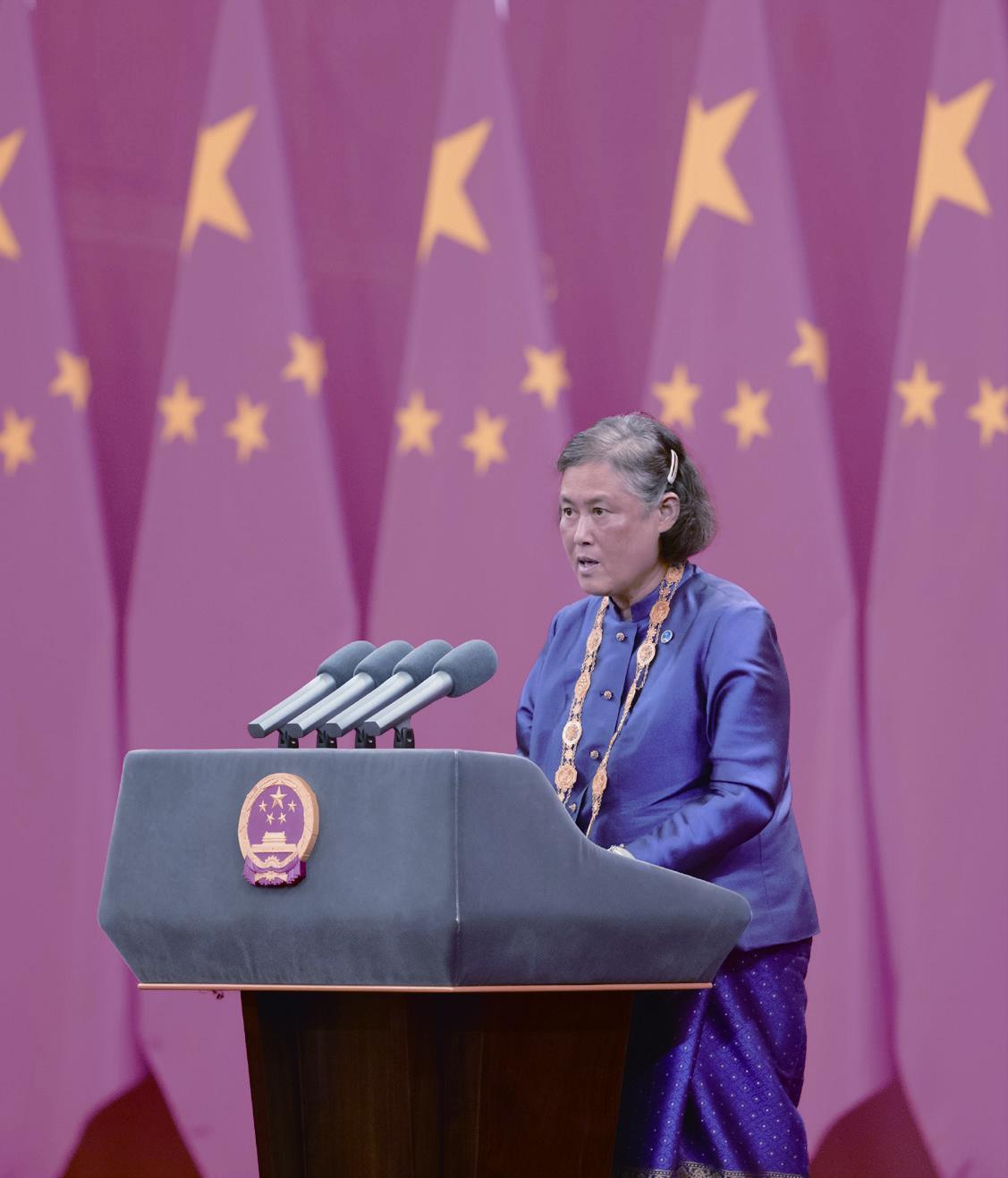FRIENDSHIP WITHOUT BORDERS
2019-10-20ByWangHairong
By Wang Hairong

In a weather-beaten dormitory at Beijing Foreign Studies University resides a 104-year-old Canadian named Isabel Crook. Born in 1915 in Chengdu, southwest Chinas Sichuan Province, to a Canadian missionary family, she has spent most of her life in China. This year, as the Peoples Republic of China(PRC) celebrated its 70th anniversary, Crook received the highest honor of her life—the PRCs Friendship Medal.
Crooks longest hiatus outside of China was six years at the University of Toronto, where she earned a master of art degree with a minor in anthropology, returning to China in 1939 and conducting anthropological research in Sichuan. She co-authored a book titled Prosperitys Predicament: Identity, Reform, and Resistance in Rural Wartime China, describing rural life in the early 1940s in a small village in Sichuan called Xinglongchang.
She married David Crook, a member of the Communist Party of Great Britain in 1942 and joined his party the same year. In 1947, the couple did research in a village called Shilidian in north Chinas Hebei Province. The name of the village is literally translated as Ten Mile Inn.“We ate millet and sweet potatoes, wore suits of homespun cloth, lived in peasant homes and slept on kangs, heatable brick beds commonly used at the time in north China. We were witness to the land reform which soon spread across China in a movement which changed history,” she recalled in an autobiographical piece. Based on their study, the couple wrote a book titled Revolution in a Chinese Village: Ten Mile Inn, which was fi rst published in London in 1959.
In 1948, the couple began teaching English in China. They taught the language at the Beijing Foreign Studies University, known as the“cradle of diplomats” from its inception to their retirement in the 1980s.
After receiving the Friendship Medal, she told the media that she was deeply honored,“I witnessed with my own eyes the rapid development and changes in the 70 years since the founding of the PRC. Not only have I experienced the great times, but also have been fortunate enough to devote myself to it and do some work,” she added.
A state honor
“We are sincerely grateful to the recipients of the Friendship Medal for their contribution to Chinas development,” said President Xi Jinping on September 29, as he presented the medals to a total of six foreign individuals, namely Cubas Raúl Castro Ruz, Thai Princess Maha Chakri Sirindhorn, Tanzanias Salim Ahmed Salim, Russias Galina Kulikova, Frances JeanPierre Raffarin and Crook.
Xi said that Chinese people are willing to work with people of all countries to build a community with a shared future for humanity and to make the planet a better place.
During the ceremony at the Great Hall of the People in Beijing, Xi also conferred the Medal of the Republic to eight outstanding Chinese nationals and national honorary titles to another 28 Chinese individuals, including such titles as “the peoples scientist,” “the peoples artist,” “the peoples hero” and“the peoples role model.”
The Friendship Medal was created in 2016 according to the Law on National Medals and National Honorary Titles, which was adopted by the National Peoples Congress (NPC) in December 2015 and went into effect in 2016, as the highest honor for foreigners who have made outstanding contributions to Chinas socialist modernization drive, promoting Sino-foreign exchanges and cooperation, and safeguarding world peace. The fi rst Friendship Medal was awarded to Russian President Vladimir Putin in June 2018.
The honor system features five medals and a Merit Book, with the five medals being the Medal of the Republic, the July 1 Medal, the August 1 Medal, the Friendship Medal and national honorary titles, to recognize individuals that have made exceptional contributions.
Envoys of friendship
After receiving the Friendship Medal, recipients shared their thoughts with the media. Miguelángel Ramírez Ramos, Cubas ambassador to China, received the Friendship Medal on behalf of Castro, First Secretary of the Central Committee of the Communist Party of Cuba. Ramírez said that the medal is not only an honor for the fi rst secretary, but also represents the goodwill of the Chinese people toward the Cuban people. Its a real joy, he said, adding that Cuba is ready to work with China to contribute to the deepening of the friendship between the two countries and to the continuous advancement of the socialist cause.
Castro has actively promoted Latin American relations with China, fi rmly supported China on major issues, resolutely agreed with the initiative of building a community with a shared future for humanity and supported China in playing a greater role in international affairs, according to awardee profi les posted on the NPC website.
Princess Sirindhorn is a household name in China as someone who has been very friendly to the country with profound knowledge of Chinese literature, history and culture. She has visited China 48 times and has made great contributions to the development of Sino-Thai relations.

She said she was very excited to receive the award from Xi. “From 1981 up to now, China has changed a great deal; I think it is due to good leadership and the qualities of Chinese people: diligence, hard work and intelligence,” she told Peoples Daily after receiving the medal.
Salim of Tanzania is an old friend of China. He is currently president of the Tanzania-China Friendship Promotion Association, and, in the past, served as prime minister and foreign minister of Tanzania and secretary general of the Organization of African Unity (predecessor to the African Union). He has been recognized for making outstanding contributions to promoting friendly cooperation between China and Tanzania, as well as between China and Africa, and restoring Chinas legitimate seat in the United Nations decades ago. He has also supported China in playing an active and important role in maintaining peace and promoting development in Africa. He has visited China many times and has attended the Forum on China-Africa Cooperation.
Salims daughter, who received the medal on his behalf, said her father was very happy upon learning that he would be awarded the honor. She said the medal was not only a tribute to her father, but also the crystallization of TanzaniaChina friendship and AfricaChina friendship.
The First Vice President of the Russian-Chinese Friendship Association, 84-yearold Kulikova said the day she received the medal was the happiest day of her life, adding that the privilege belongs not only to her, but also to her colleagues who are committed to promoting friendship with China.
Kulikova learned Chinese at the Moscow State Institute of International Relations and participated in the establishment of the Soviet Union-China Friendship Association in 1957. In 1989, she was elected the first vice-chairperson of the association and began to work at the Embassy of the Soviet Union in China. She wrote a book on public diplomacy between Russia and China, documenting friendly exchanges between the two peoples.
Former French Prime Minister Raffarin was also very excited about receiving the medal. He said the fact that the Chinese people regard him as a messenger of friendship is recognition of his work, stating that he would like to help the world understand China better.
Raffarin has long been committed to promoting China-France friendship and allaround cooperation. As prime minister, he insisted on visiting China as planned during the outbreak of severe acute respiratory syndrome in the country in 2003, giving great political and emotional support to the Chinese people. He has vigorously promoted cooperation under the Belt and Road Initiative, and as a representative of the French president, he attended the First Belt and Road Forum for International Cooperation held in Beijing in 2017. In addition, he and his wife co-authored a book on China.
All medal recipients expressed a common wish for a more prosperous China and a deeper friendship with the Chinese people.
